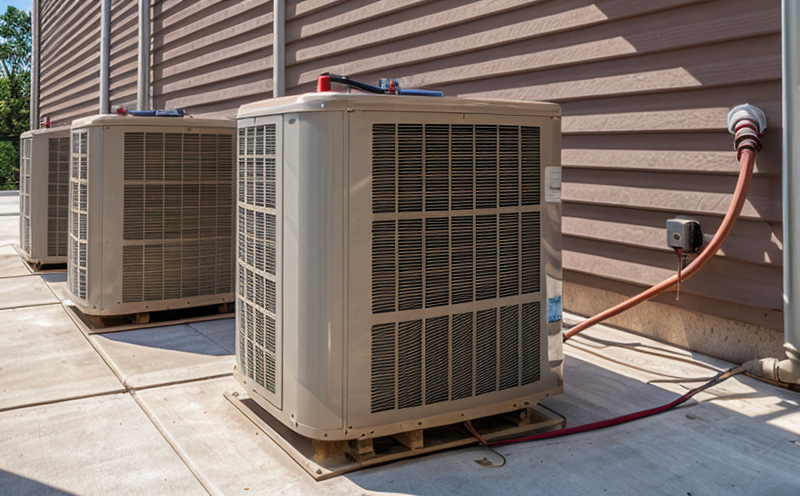EN 1886 Ventilation for Buildings
The European Standard EN 1886 specifies requirements and test methods to ensure proper ventilation within buildings. This standard covers the design, installation, commissioning, and performance of mechanical ventilation systems in non-residential buildings. Ensuring compliance with this standard is crucial for maintaining indoor air quality and energy efficiency.
The scope of EN 1886 includes:
- Design considerations
- Installation processes
- Commissioning procedures
- Performance testing criteria
The standard is applicable to all types of non-residential buildings, such as offices, hospitals, schools, and retail spaces. It aims to provide a harmonized approach across Europe for the ventilation systems that contribute significantly to indoor air quality and occupant comfort.
Some key features of EN 1886 include:
- Airflow measurement
- Dust particle count monitoring
- Carbon dioxide levels detection
- Temperature and humidity control evaluation
The standard also emphasizes the importance of energy efficiency, which is why it includes provisions for minimizing energy consumption without compromising on ventilation performance.
To ensure that ventilation systems meet EN 1886 standards, specialized testing procedures are necessary. These tests typically involve:
- Field measurements
- Instrumentation checks
- Data logging and analysis
- Report generation
Our laboratory utilizes state-of-the-art equipment to perform these tests accurately. Our team of experts ensures that every aspect of the ventilation system is evaluated according to EN 1886 guidelines.
The significance of this standard cannot be overstated, as it directly impacts the health and well-being of building occupants by providing clean, fresh air. Compliance with EN 1886 helps prevent respiratory problems, enhances productivity, and reduces absenteeism due to illness.
In addition to health benefits, compliance also leads to cost savings through reduced energy consumption and increased longevity of mechanical components. Proper ventilation systems contribute significantly to a building’s sustainability goals by optimizing resource use.
Why It Matters
The importance of proper ventilation in buildings cannot be overstated, especially given the increasing emphasis on sustainable practices and occupant health. Ventilation systems play a critical role in maintaining indoor air quality, which is essential for promoting the well-being of building occupants.
- Air Quality: Proper ventilation helps to remove pollutants and harmful gases from the indoor environment, thereby improving air quality.
- Energy Efficiency: Efficient ventilation systems can significantly reduce energy consumption by optimizing airflow and temperature control.
- Sustainability: Complying with EN 1886 helps buildings meet their sustainability goals by minimizing environmental impact.
Non-compliance with EN 1886 can lead to various problems, including:
- Poor indoor air quality
- Inefficient energy usage
- Increased risk of mold and mildew growth
By ensuring compliance with EN 1886, building owners and managers can avoid these issues while simultaneously enhancing the overall performance of their ventilation systems.
Benefits
- Better Indoor Air Quality: Proper ventilation ensures that harmful pollutants are removed, leading to cleaner air inside buildings.
- Energy Efficiency: Efficient systems reduce energy consumption by optimizing airflow and temperature control.
- Sustainability: Compliance helps in achieving sustainability goals by minimizing environmental impact.
- Occupant Health and Well-being: Clean air promotes better health, reducing the risk of respiratory issues and other ailments.
In addition to these benefits, compliance with EN 1886 also helps in achieving regulatory requirements. This ensures that buildings are safe, comfortable, and energy-efficient, meeting both legal and practical standards.
Quality and Reliability Assurance
- Accurate Testing: Our laboratory uses advanced instruments to ensure accurate measurements of airflow, temperature, humidity, and other parameters.
- Comprehensive Reporting: Detailed reports are generated after each test, providing a clear overview of the system’s performance.
- Expert Evaluation: Our team of experienced engineers provides expert evaluation and interpretation of the results.
We adhere to international standards such as EN 1886, ISO 9001:2015 for quality management systems, and IEC 61439-1 for electrical equipment, ensuring that our testing methods are reliable and consistent. Our commitment to accuracy and reliability is further enhanced by rigorous calibration of all instruments used in the testing process.
Our laboratory has a proven track record of delivering high-quality results, which have been recognized by numerous clients across various sectors. We pride ourselves on providing comprehensive testing services that not only meet but exceed industry expectations.





